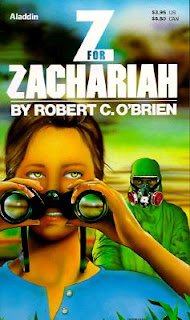Digging Holes and Connecting Dots: Rereading Holes 20 Years Later
When I was in fifth grade, my teacher read a number of books to the class. Stuart Little. Maniac Magee. From the Mixed-Up Files of Mrs. Basil E. Frankweiler. Number the Stars.
But one that sticks with me the most is Louis Sachar's Holes. Though I remember the other books being part of that year, Holes is the one I remember whole passages being read in my teacher's voice. When the movie came out, I remember loving that the story was presented so faithfully (something I attribute to Sachar's screenplay more than anything). This story has fixed itself firmly in my imagination like few other books from that period of my life.
Recently, inspired by some posts raving about the movie adaptation, I picked up Holes again and reread it for the first time since it was read to me almost 20 years ago. (And if you want to feel old in a hurry, just realize that a book you thought you hadn't read for 10 years is really from 20 years ago. Not that I speak from experience or anything.)
From the first page, I was back in a story that felt as familiar as breathing. I don't have a lot of stories that do that for me. Narnia. The Lord of the Rings. The Westing Game. The Attolia books. It surprised and delighted me to find that I could come back to Holes and find it as rewarding as that first time so many years ago. Some of the familiarity stemmed from having seen the movie in whole or in part more recently than I'd read the book (though still not in the last few years). But there were some passages, such as the opening chapter, that felt as familiar as if I had read the book only months ago, not years.
I've been thinking about why this book has stuck with me--why the story of a boy wrongfully imprisoned whose luck turns around resonates so deeply with me. And I think the answer is this: Providence.
Sachar's narration doesn't frame it that way. His only mention of God is in the flashback to Kate Barlow when the townsfolk burn the schoolhouse and kill Sam the onion man. The sheriff says that God will judge Kate. After relating that the lake dried up after this injustice, the narrator tells the reader to decide who God judged.
But despite the fact that God is largely left out of the story, the story itself is filled with moments of Providence. Hector/Zero and Stanley connect through the stolen shoes; later they are both sent to Camp Green Lake, which connects to Stanley's family history via his great-grandfather, who was robbed by Kate Barlow. Stanley carries Zero up the mountain and sings to him while he drinks, breaking the curse Madam Zeroni placed on Stanley's great-great-grandfather years before (that is, if you believe there ever was a curse). These connections might be too many coincidences for realism, but they're the sort of interconnectivity that I love to see in a story.
It's only through their incarceration together that Stanley and Zero are able to find their better selves and their happy endings. Stanley breaks the curse on his family and learns to be a self-sacrificing friend. Zero learns to read and reunites with his mother. The friendship between their families is restored. None of these things could happen without their time at Camp Green Lake, and that speaks to me of Providence--a divine guiding hand that brings about the best ending, even if the journey leads through dark valleys.
Even as a child, I loved finding out that there was a deeper connection between characters than what we have seen or heard in the present moment of a story. I loved finding that there were more layers to a story than there first appeared, and it was only better if a story revealed that a greater power was moving in the story to being about a good end.
But one that sticks with me the most is Louis Sachar's Holes. Though I remember the other books being part of that year, Holes is the one I remember whole passages being read in my teacher's voice. When the movie came out, I remember loving that the story was presented so faithfully (something I attribute to Sachar's screenplay more than anything). This story has fixed itself firmly in my imagination like few other books from that period of my life.
Recently, inspired by some posts raving about the movie adaptation, I picked up Holes again and reread it for the first time since it was read to me almost 20 years ago. (And if you want to feel old in a hurry, just realize that a book you thought you hadn't read for 10 years is really from 20 years ago. Not that I speak from experience or anything.)
From the first page, I was back in a story that felt as familiar as breathing. I don't have a lot of stories that do that for me. Narnia. The Lord of the Rings. The Westing Game. The Attolia books. It surprised and delighted me to find that I could come back to Holes and find it as rewarding as that first time so many years ago. Some of the familiarity stemmed from having seen the movie in whole or in part more recently than I'd read the book (though still not in the last few years). But there were some passages, such as the opening chapter, that felt as familiar as if I had read the book only months ago, not years.
I've been thinking about why this book has stuck with me--why the story of a boy wrongfully imprisoned whose luck turns around resonates so deeply with me. And I think the answer is this: Providence.
Sachar's narration doesn't frame it that way. His only mention of God is in the flashback to Kate Barlow when the townsfolk burn the schoolhouse and kill Sam the onion man. The sheriff says that God will judge Kate. After relating that the lake dried up after this injustice, the narrator tells the reader to decide who God judged.
But despite the fact that God is largely left out of the story, the story itself is filled with moments of Providence. Hector/Zero and Stanley connect through the stolen shoes; later they are both sent to Camp Green Lake, which connects to Stanley's family history via his great-grandfather, who was robbed by Kate Barlow. Stanley carries Zero up the mountain and sings to him while he drinks, breaking the curse Madam Zeroni placed on Stanley's great-great-grandfather years before (that is, if you believe there ever was a curse). These connections might be too many coincidences for realism, but they're the sort of interconnectivity that I love to see in a story.
It's only through their incarceration together that Stanley and Zero are able to find their better selves and their happy endings. Stanley breaks the curse on his family and learns to be a self-sacrificing friend. Zero learns to read and reunites with his mother. The friendship between their families is restored. None of these things could happen without their time at Camp Green Lake, and that speaks to me of Providence--a divine guiding hand that brings about the best ending, even if the journey leads through dark valleys.
Even as a child, I loved finding out that there was a deeper connection between characters than what we have seen or heard in the present moment of a story. I loved finding that there were more layers to a story than there first appeared, and it was only better if a story revealed that a greater power was moving in the story to being about a good end.




Comments
Post a Comment
What do you think?